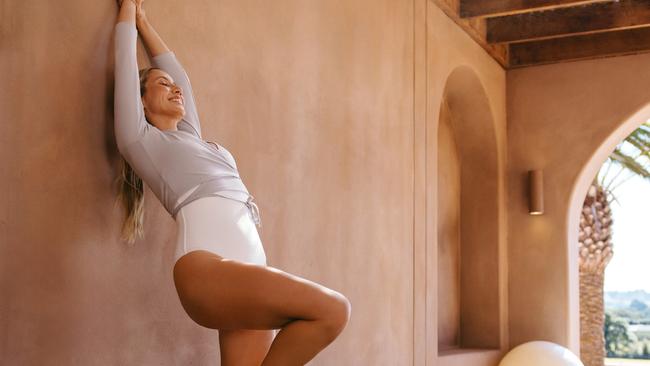The menopause movement: how long will it last?
Clinicians, brands and beauty experts are releasing potions, pills and programs to flip the script on this phase of life for women.

A few years ago, one stiflingly humid summer’s day, Nikki Goldstein was long-lunching in Sydney when one of her girlfriends suddenly turned tomato-red, perspiration gathering on her temples and top lip. She abruptly rushed to the bathroom, returning half an hour later deeply embarrassed. It kickstarted a conversation about the women’s menopausal symptoms.
One couldn’t sleep, another complained of a burning, dry vagina and admitted she hadn’t had sex with her husband for years, someone else declared they experienced depressive bouts, with Goldstein revealing inexplicable anxiety episodes. “These things had been discussed fleetingly in previous conversations, mostly with each other in private, but never aired in a group setting,” says the Sydney writer. “We laughed, we held ourselves back from ugly-crying, but it was cathartic and therapeutic.”
Menopause is the hot-button issue of the moment. And even though we’re living in a time of “menopositivity”, the former journalist turned sexologist and relationship expert remains shocked by the confusion surrounding this phase in a woman’s life, the lack of candour and reluctance to talk about its nitty-gritty. So rather than waiting for a traditional publisher to pick it up, Goldstein, already an author of 11 books, self-published Menopause: The Facts, the Fixes and the New You.
According to the Australasian Menopause Society, 1.1 billion women globally will be postmenopausal by 2025, with about 80 per cent of those experiencing menopausal symptoms, a third of them severe. It’s estimated almost half of Australian women in their early fifties experience significant symptoms (the average age Aussie women reach menopause is 51, with perimenopause starting anywhere between four and 10 years prior). Only 15 to 20 per cent of Australian women seek out treatment, with symptoms lasting on average between three and six years.
The global menopause wellness market, non-existent little more than a decade ago, is forecast to be worth $49.5 billion by the end of 2033, up from $18.48 billion in 2023. Menopause, once shrouded in silence, stigma and shame, has gone mainstream.
So, what’s put it at the forefront of women’s health conversations, inspiring women such as Goldstein to drive frank and open discussion? For starters, social media has perhaps packed the most powerful punch. Credible “influencers” such as Dr Mary Claire Haver (@drmaryclaire), best-selling author of The New Menopause, with her 1.6 million Instagram followers; Dr Jen Gunter who’s behind thevajenda.com and pens an excellent Substack (@drjengunter); Dr Louise Newson (@menopause_doctor) in the UK; and Sydney GP Dr Ceri Cashell who speaks to mainstream media to raise awareness around systemic failures and will deliver these insights to the Senate Inquiry into menopause that reports in September.
Celebrities openly sharing their experiences are also making the topic less taboo. Oprah Winfrey has written widely on how, at 48, a doctor prescribed medication for a heart condition, palpitations that were later linked to perimenopause. Drew Barrymore has signed on to become an ambassador for the menopause “supplement” &Me; and in late June, LVMH’s private-equity arm L Catterton announced the acquisition of Naomi Watts’s popular Stripes skincare brand, which was launched by the Australian actor in 2022 to address peri- and menopausal skin needs.
It’s a space where opportunities abound (as the L Catterton acquisition illustrates), with pills, potions, workshops, books and retreats now catering to the peri- and menopause markets. Pilates guru Kirsten King has just added a six-week peri- and menopause program to her Fluidform at Home platform, conservatively estimating 15 per cent of her female client base are in this phase. King promises the program will improve bone density, bladder function, sleep, digestion, muscle and joint pain, mood and energy levels.
“Many women still don’t want to talk about it,” she admits. “They’re emotional and when you feel awful in your skin it’s the worst feeling, especially when your girlfriends don’t have one symptom. There’s the thickness that comes through the torso and an overall loss of muscle. It’s like it dissolves.”
Other changes King notes: less-defined triceps, waists disappear, bottoms dissolve, and a loss of elasticity around the top of knees. “This program focuses on plyometrics – jumping and skipping; pelvic floor activation to improve bladder function; and strength and resistance that’s low impact and higher intensity.”
A meal plan is also integral to the program. “With food it’s more important to consider ‘how to eat’ rather than just what to eat,” says King, who advocates three meals a day and one snack. “That’s a Mediterranean diet that includes plant-based foods in abundance, leafy green vegetables, and anti-inflammatory foods – your fatty fish, cherries, lentils, chia seeds and dark chocolate. You’re trying to build muscle back in your body and counteract high levels of inflammation.”
Need a little more hand-holding? You may be too late to sign up to the first four-day Mastering Menopause program that kicks off this month (August 18-22) at Queensland’s Gwinganna Lifestyle Retreat. But another is slated for December, led by women’s health expert Dr Karen Coates and natural skincare proponent Vanessa Gray Lyndon, founder of Vanessa Megan Skincare.
A changing body shape isn’t the only thing that betrays you during this time. Estrogen’s rush for the exit means your skin loses its ability to retain moisture and produce collagen, leading to dryness. Cracks can appear in the sides of your mouth, rosacea may worsen, jowls sag, bouts of acne return and chin hairs and peach fuzz start to sprout.
Sydney’s Dr Amy Chahal says skin laxity worries women the most so she prescribes her menopausal patients a good skincare regimen. “That’s a gentle hydrating cleanser that won’t strip the skin of its natural oils, a high-quality moisturiser with hyaluronic acid, ceramides and lipids to rebuild the barrier and lock in moisture. And serums or creams that contain retinoids [to encourage cell turnover], peptides [to boost elasticity] and antioxidants to combat free radical damage.”
Sydney dermal clinician Jodie King is a fan of bespoke products such as the Universkin brand that allows her to customise serums to address individual concerns, selecting from 19 actives so she can increase their strength as needed. “Menopausal women aren’t looking for overly drastic changes,” explains King. “Just treatments that will potentially take five years off. Now’s the time to explore CO2 laser treatments to trigger collagen production, chemical peels, micro needling and RF needling. That way you’ll address texture and tone, treat pigmentation and stimulate collagen production,” she advises.
Chahal agrees, focusing on rejuvenation – not transformation. “Ageing is ageing,” she says. “Most importantly, self-acceptance is key. Women need to focus on maintaining health and vitality, rather than reversing age.”
Another significant changes for women is hair loss. Again, a result of tanking oestrogen levels. Eighty per cent of women are affected by hair thinning and slower growth, says Goldstein. “Other symptoms tend to fade away as time goes on, but this is a problem that won’t magically disappear. Your longstanding routines won’t work anymore.”
Renowned Sydney colourist Belinda Jeffrey, of La Boutique Double Bay, suggests a mix of highlights and lowlights to provide variation, especially for those going grey. “For blondes, opt for a mix of creamy blonde and honey instead of solid platinum as that gives the illusion of hair being thicker and healthier,” she says.
Jeffrey’s gold-standard tip though when it comes to dramatic hair changes is not to waste time and always consult a trichologist. (Her go-to: Chelcey Salinger at hairlossspecialist.com.au).
As for news that 59-year-old Brooke Shields has just launched her own “middle age” haircare range of scalp soothers and hair protectors, Commence, aimed squarely at the forties, fifties and beyond set? Call us cynical but we’ll pass, thanks.

This story is from the August issue of WISH.




To join the conversation, please log in. Don't have an account? Register
Join the conversation, you are commenting as Logout